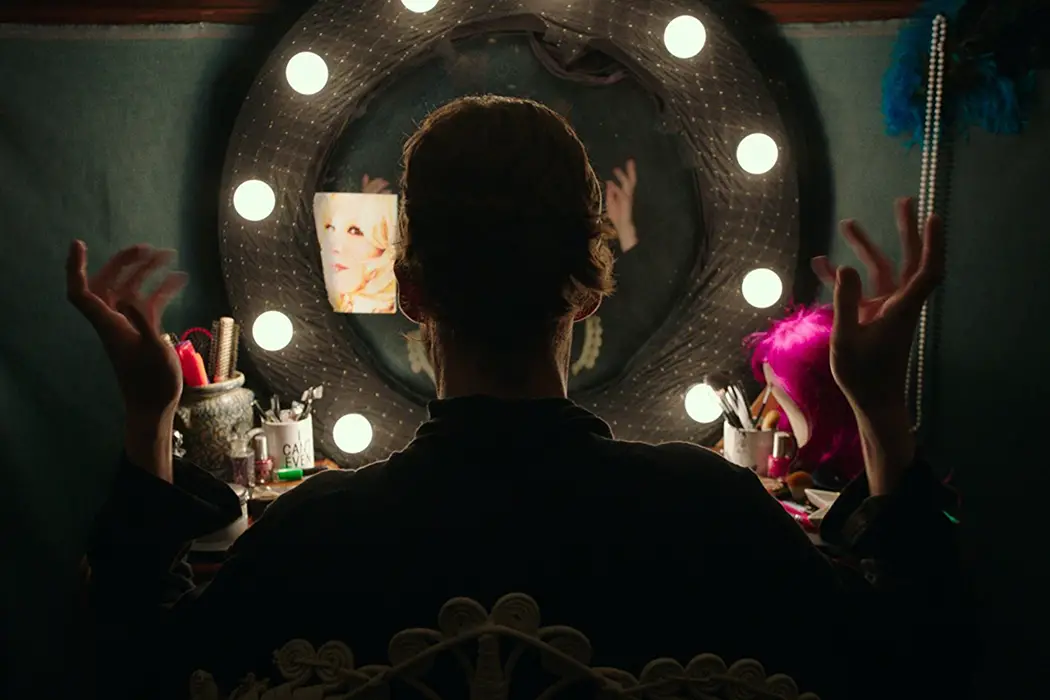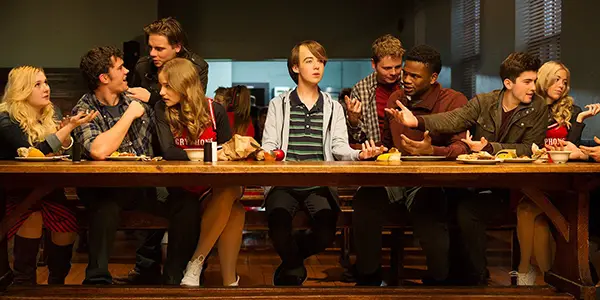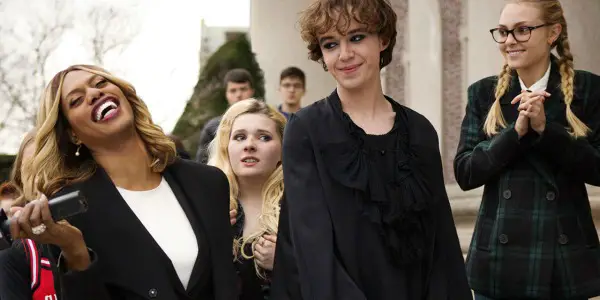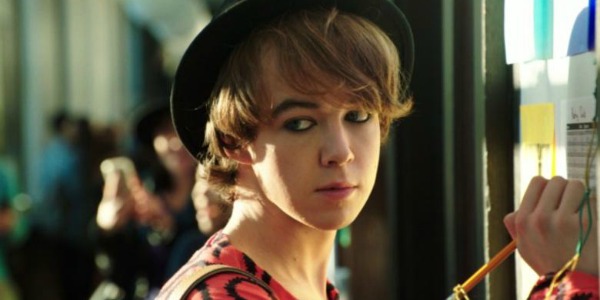FREAK SHOW: Alex Lawther Dazzles In A Transformative, Career-Making Performance

Alex Arabian is a freelance film journalist and filmmaker. His…
Heavyweight producer Trudie Styler’s (Moon, Still Alice, American Honey) directorial debut, Freak Show, is far from perfect, but Styler establishes tremendous promise, a keen eye for framing, setting, visual presentation, and occasionally displaying signs of an auteur-in-the-making through several exhilarating and well-crafted scenes and sincere moments. The monumental standout in Freak Show, however, is Alex Lawther as the fearless, gender nonconforming Billy Bloom. Freak Show tells the story of Bloom through his eyes as he is forced to move to Florida, a conservative red state, with his conservative father, and spend senior year of high school at an even more conservative school.
At the Dwight D. Eisenhower Academy, Bloom is ridiculed, bullied, viciously attacked, and has to navigate through female bible-reciting, hypocritical Jesus freaks, male jocks on the football squad, and relentless preppy students who jump on the bandwagon of communal hatred of his differences. Aside from the character of Bloom, who is authentic and substantive, the aforementioned secondary characters and students are, for the most part, hyper-exaggerated, unrealistic, and cookie cutter depictions of high school cliques.
Screenwriters Patrick J. Clifton (Son In Law with Pauly Shore) and Beth Rigazio (Disney Channel Originals, Read It And Weep and Go Figure), who collaborated previously on the story for the critical disaster Raising Helen, seem like an odd choice to adapt author James St. James’ (Party Monster) source material. However, Styler, executive producer Drew Barrymore, and the cast do their best to bring the, at times, sloppy screenplay to life.
At Times Familiar, At Times Choppy, At Times Invigorating
Most audiences have likely seen a lot of the material presented in Freak Show before in other high school films; the theme of misunderstood youths, an alcoholic mother, an unaccepting father (or vice versa), one-dimensional high schoolers acting up against the protagonist with no clear motives, a few good eggs, the whole plot revolving around a homecoming dance, hidden romances.
The only thoroughly developed character is Lawther’s Billy Bloom. It’s paramount to have an empowering character like Bloom well-written, but Clifton and Rigazio fail to add depth to anyone else. The only two people who initially accept Bloom are Blah Blah Blah (AnnaSophia Robb) and Flip Kelly (Ian Nelson). Even their characters aren’t developed enough and therefore don’t quite seem real enough to relate to as much as is needed for emotional resonance; they seem expendable, even to Bloom.
Styler hasn’t worked out the kinks in her filmmaking style yet, and that’s entirely understandable for a feature debut. At times, she doesn’t linger on a scene as much as she could have, and sometimes the cuts between scenes are slightly too quick or jolting. This may also be attributed to the style of editor Sarah Flack (Lost In Translation), and in other films, that style would work, but it doesn’t quite mesh well with Styler’s vision. There are certain scenes that feel like rough cuts where Styler’s camerawork is a bit spasmodic; she tends to have a difficult time capturing the right amount of finesse on a closeup or a medium closeup.

However, Freak Show, from a general directorial standpoint, is predominantly applaudable. Styler puts together some fantastic sequences, pop-laden, toe-tapping scenes, and visual arrangements that are amplified by Dante Spinotti’s (L.A. Confidential, The Insider) cinematography. Styler certainly has an eye for what makes a shot work and what doesn’t, and seems to be more-than-adept at choreographing scenes and creating layered, often meticulous backdrops and focal points. Her effort certainly overcomes some of the stale dialogue provided by Clifton and Rigazio.
An Underused Secondary Cast In A Sea Of Unrealistic Secondary Characters
Robb and Nelson give effective performances as Blah Blah Blah and Flip. However, there are periods of time in Freak Show where they seem to disappear from the narrative, which is somewhat odd given how important they are to Bloom. It appears Clifton and Rigazio didn’t know how much of Blah Blah Blah and Flip to use in Freak Show’s 95-minute runtime. Flip, in particular, deserved much more of an emotional payoff than the screenwriters gave him, and it would have meant a lot more to Bloom if Flip’s character arc was more complete, especially with Nelson’s commitment to the role.
Robb’s Blah Blah Blah is an absolute sweetheart in the film, and a key gateway to Bloom’s discovering of the “shadowpeople,” the only secondary characters in the film that aren’t seemingly crazed, prejudice, or villainized. There seems to be, however, a sense of realism missing in her character, as she isn’t given enough lines to establish much of a personality. However, Robb adds as many quirks and nuances as she can in the role.

Abigail Breslin plays Lynette, the promiscuous, Christian cheerleader whose only purpose in the story is to act as the villain. She even proclaims at the homecoming dance that “All gays go to hell – Leviticus.” If this were real life, that student would at least get suspended for that comment, one would hope, even in Florida. Breslin has such a wide range as an actor, that having her in a one-dimensional, one-note role that’s so redundant and cliché that it becomes cringe-worthy is a vast underutilization of her talents.
Two pleasantly surprising cameos that the viewer might have wished to see more of in Freak Show is tennis legend John McEnroe as Coach Carter and Laverne Cox as the local TV station news reporter Felicia Watts. Perhaps the most underused actor in Freak Show, however, is the great triple-threat Bette Midler as Bloom’s alcoholic mother, Muv. Midler is only in a handful of scenes, but her presence is more-than-felt in the film. Alas, perhaps a formidable and famous actor such as Midler would distract from the plot and intended themes of Freak Show.
For as grounded and fleshed out of a character as Billy Bloom is, the world he lives in seems like fantasy, at times. No matter how conservative a school is, in 2018, there simply aren’t instances anymore where the entire school partakes in collective bullying against one student, day after day, while the staff turns a blind eye. Sure, a lot of students may have a problem with gender nonconformist or transgender students, but there is a lot more acceptance and indifference in this day and age.
Perhaps even more unrealistic is the sudden transformation of mindsets of the entire student population to not only accept Bloom after taking such a firm stance against him, but to celebrate him. It conveys an important lesson of tolerance and it’s a cheer-worthy and inspiring moment in Freak Show, but it’s problematic in that nobody is held responsible for their previous actions, particularly the staff.
The Performance That Saves The Film
Lawther embraces and inhabits the role of Billy Bloom meticulously to the point the audience may forget where Lawther ends and Bloom begins. Lawther is predominantly known for shy, understated performances such as the young Alan Turing in The Imitation Game and Kenny on the episode, Shut Up and Dance on Season 3 of the hit show Black Mirror. Perhaps, given his previous typecasting, seeing him in such an outgoing role makes his performance even more impressive.
Some actors’ approaches to an eccentric role like Billy Bloom, who wears extravagant outfits and Bowie and Lady Gaga-esque makeup everyday, may have been over-the-top or out-of-touch, but Lawther makes Billy Bloom utterly genuine in every aspect. Lawther provides Bloom with a tremendous magnitude of confidence, as is required given Freak Show’s fish-out-of-water premise. However, he allows a certain sensitivity to seep in at moments when it seems needed the most; Lawther is intuitive and perceptively brilliant.

Wardrobe Superviser Lisa Harlow-Powell, Makeup Department Head Anouck Sullivan, and Hair Department Head Jennifer Tremont and their respective teams deserve shoutouts for their phenomenal work in their assistance in transforming Lawther from persona to persona, gender to gender, and into a “trans-visionary,” as Bloom proclaims at one point in Freak Show.
Freak Show: An Important Film About Celebrating Diversity Despite Its Flaws
Though Freak Show could have been a better film had the script been in different hands than those of Clifton and Rigazio’s, it is ultimately an enjoyable film and a key entry into LGBTQ cinema. That isn’t to say that it is not a film that should be seen by all audiences; it absolutely should be. In an America that is losing its sense of inclusiveness and greatness through its prejudice and divisive leadership, Freak Show is a film with essential, critical themes.
Styler gives an admirable directorial debut despite a few minor missteps with Freak Show, bringing a career-making performance out of Alex Lawther and breathing life into Clifton and Rigazio’s mediocre adaption of St. James‘ novel with tact.
Were you surprised by Lawther’s uncharacteristic performance? What was your favorite aspect of Freak Show?
Freak Show was released in the U.S. on January 12, 2018 in limited theaters and on on demand digital platforms. For all information on international release dates, see here.
Does content like this matter to you?
Become a Member and support film journalism. Unlock access to all of Film Inquiry`s great articles. Join a community of like-minded readers who are passionate about cinema - get access to our private members Network, give back to independent filmmakers, and more.
Alex Arabian is a freelance film journalist and filmmaker. His work has been featured in the San Francisco Examiner, The Playlist, Awards Circuit, and Pop Matters. His favorite film is Edward Scissorhands. Check out more of his work on makingacinephile.com!












